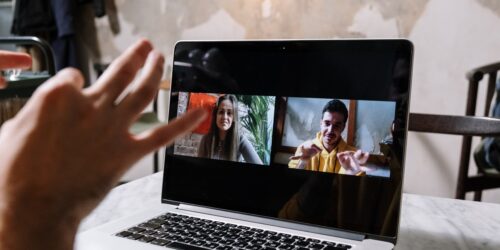Help Students Learn About Conflict in Group Work
Each section provides an idea and sample resource or resource repository for building skills to have difficult conversations and address disputes in student group work. Activities should be selected and adapted to fit the course outcomes and the level and background of your student (Shaw et al., 2015).
Please note that the resources below relate to disagreements and conflicts during assigned group work. Students concerned about a violation of their student rights should review the Student Rights and Responsibilities Office website. Also, remind students of your zero-tolerance policy for discrimination and harassment. Review the Conestoga College’s Discrimination & Harassment Prevention Policy.
Share the idea that disagreement can be healthy for group work
When students know that disagreements can be a “normal” and “healthy” part of group work, they can prepare to expect it and manage it before it becomes conflict. They can also begin to think about conflict not as a two-person problem but rather as affecting the whole group (and for which the whole group is accountable). Use Bruce Tuckman’s Stages of Group Development to help students learn about the “storming” stage. See this video on How to Build a High-Performance Team – The Storming Stage.
Share stories from those who excel in debate and/or dispute resolution
Many people have negative associations with debate, arguments, and conflict. When students learn about the mindset and practices of experts in debate or dispute resolution, they can start to reframe their thinking to consider the benefits of argumentation. For example, see the podcast interview How to have good arguments with world debate champion Bo Seo | ReThinking with Adam Grant.
Reflect on how students (differently) manage conflict
When students reflect on how they may have learned to respond to conflict growing up, they may gain insights into their “go to” responses while acknowledging that others grew up differently. Students can be prompted to consider when different conflict management styles might be appropriate, leading to positive results and supporting group members’ relationships. See the video “Thomas Kilmann Conflict Handling Modes Model by Karen Nesbitt” for an example.
Reflect on cultural differences and intercultural communication
Conflict management patterns can differ across countries, cultures, and ethnic groups. Students from different cultures will likely have different interaction and communication styles, which can lead to conflict (Popov et al., 2022). It can be useful to reflect on the role of culture in negotiations and conflict and strategies for effective intercultural communication. See the video “How to manage cross-cultural conflict” by Headington Insitute.
Observe and discuss a disagreement or difficult conversation
When students watch and discuss an argument, they can gain skills in describing the cause of an argument, identifying what each side wants, and selecting a resolution to achieve shared goals. You may wish to use a simulated role-play, such as “Conflict Between Two CHWs,” or an excerpt from a fictional movie. (If you search for media on Youtube, search for videos licensed under Creative Commons.)
Reflect on past conflicts and create guidelines for handling conflict
When students reflect on their past conflicts, they may be able to build on learning from their past experiences. A conflict guide that is co-created with students for the class may also assist buy-in when engaging in difficult conversations with their peers. See the activity Conflict Responses (Session Lab).
Give prompts and models to practice disagreeing
When students have language prompts, they practice using words and phrases that promote active listening and respectful disagreement. Ask students to determine whether they agree or disagree on topics of medium importance (e.g., should all grades be removed to Pass/Fail; should fast food have an extra tax), and have them practice disagreeing using Discussion Skill Sentence Starters.
As well, when students have models or “blueprints” for having difficult conversations, they can practice within a structure of discussion that is likely to promote fairness, respect, and positive outcomes. See the LinkedIn Learning video, Having Difficult Conversations – The blueprint for a difficult conversation.
Provide dispute resolution role play or case-based learning
Students who have built a strong foundation of self-reflection, conflict management, and communication skills may be ready to apply their skills in realistic and complex situations. See Michael Quartermain’s (School of Business) post to Help Students Build Dispute Resolution Skills for Group Work. For additional PBL/CBL activities, see the list of PBL Groups in Action at the bottom of the Resources page for the University of Delaware’s PBL Clearinghouse.
Final Thoughts
Even in practice during learning activities, students may feel uncomfortable disagreeing with each other and discussing conflict in class. As well, during practice feelings can easily become involved. Thus, faculty play an important role in carefully modelling, guiding, supporting, and monitoring these activities.
Group work performance improves when faculty give feedback on how students use their negotiation skills (Johnson & Johnson, 2008). However, regularly seeking feedback from students to ensure they feel safe and supported during these learning activities is also a good idea.
Find more video resources on having difficult conversations and conflict resolution in group work through the College’s subscription to LinkedIn Learning:
- Conflict Resolution Foundations
- Conflict Resolution for Beginners
- Managing Team Conflict
- How to Resolve Conflicts
- Having Difficult Conversations
- Communicating Across Cultures
- Communicating Across Cultures Virtually
References
Johnson, D. W., & Johnson, R. T. (2008). Social interdependence theory and cooperative learning: The teacher’s role. In R. M. Gillies, A. Ashman, & J. Terwel (Eds.), The teacher’s role in implementing cooperative learning in the classroom (pp. 9–36). Brisbane: Springer.
Popov, V., Brinkman, D., Fortuin, K., Lie, R., & Li, Y. (2022) Challenges home and international students face in group work at a Dutch university, European Journal of Engineering Education, 47:4, 664-678, DOI: 10.1080/03043797.2022.2044762
Shaw, J., Mitchell, C., Del Fabbro, L. (20150. Group Work: Facilitating the Learning of International and Domestic Undergraduate Nursing Students. Education for Health 28(2). p 124-129, | DOI: 10.4103/1357-6283.170123



